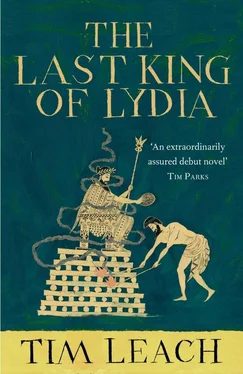Tim Leach - The Last King of Lydia
Здесь есть возможность читать онлайн «Tim Leach - The Last King of Lydia» весь текст электронной книги совершенно бесплатно (целиком полную версию без сокращений). В некоторых случаях можно слушать аудио, скачать через торрент в формате fb2 и присутствует краткое содержание. Год выпуска: 2013, ISBN: 2013, Издательство: Atlantic Books Ltd, Жанр: Исторические приключения, на английском языке. Описание произведения, (предисловие) а так же отзывы посетителей доступны на портале библиотеки ЛибКат.
- Название:The Last King of Lydia
- Автор:
- Издательство:Atlantic Books Ltd
- Жанр:
- Год:2013
- ISBN:9780857899200
- Рейтинг книги:5 / 5. Голосов: 1
-
Избранное:Добавить в избранное
- Отзывы:
-
Ваша оценка:
- 100
- 1
- 2
- 3
- 4
- 5
The Last King of Lydia: краткое содержание, описание и аннотация
Предлагаем к чтению аннотацию, описание, краткое содержание или предисловие (зависит от того, что написал сам автор книги «The Last King of Lydia»). Если вы не нашли необходимую информацию о книге — напишите в комментариях, мы постараемся отыскать её.
The Last King of Lydia — читать онлайн бесплатно полную книгу (весь текст) целиком
Ниже представлен текст книги, разбитый по страницам. Система сохранения места последней прочитанной страницы, позволяет с удобством читать онлайн бесплатно книгу «The Last King of Lydia», без необходимости каждый раз заново искать на чём Вы остановились. Поставьте закладку, и сможете в любой момент перейти на страницу, на которой закончили чтение.
Интервал:
Закладка:
Croesus saw that Cyrus was not angry at the news. He had never seen the Persian king in a rage, and even now, a faint sense of frustration was all that was apparent, the frustration of a man facing a problem that was well within his powers, almost insultingly so, but that would take time and precious energy to solve.
‘Now,’ said the king, ‘explain to me again what has happened, Cyraxes. And perhaps, more importantly, how we have allowed it to happen.’
‘Pactyes-’
‘A man you recommended to me.’
‘Yes. He has declared himself ruler of Lydia, and bought himself an army. He is besieging our regent-’
‘Tabulus.’
‘Yes. He is under siege in Sardis.’
‘What did Pactyes use to buy his army?’
‘Gold.’
‘The gold that we gave him.’
Cyraxes bowed his head. ‘Yes.’
‘You see, Croesus? Your riches haunt me still.’ Cyrus looked back at his courtiers. ‘How did this happen?’
No one answered, and Cyrus divided his gaze equally between Harpagus and Cyraxes. ‘I should have known that there was something wrong,’ the king said eventually, ‘when you both agreed that he was the man to trust. It was unprecedented — an appointment without an argument. Now I see there is much to be said for precedent. But what is to be done now? Harpagus?’
‘His army won’t be able to resist ours. A single battle is all it will take to rout them.’
‘You are certain?’
‘Quite certain. A man like Pactyes assumes that loyalty can be bought.’
‘And it cannot?’
‘It can for a battle. Not for a war. His mercenaries cannot compare to our soldiers.’
‘Why?’
‘Your men don’t follow you for the gold,’ Harpagus said matter of factly. ‘They follow you because they love you.’
‘How kind of you to say so,’ Cyrus said. ‘Very well. Take half the army. You will travel faster that way.’ Cyrus held out a hand, and a servant handed him a skin of wine. He drank, and passed it back. ‘So, what do we do afterwards?’
Harpagus frowned. ‘What do you mean, sire?’
‘For such a practical man, Harpagus, you surprise me. What do we do about Lydia?’
Silence fell, and every one of the courtiers turned to look at Croesus, kneeling at the king’s side. Cyrus did not. ‘If they can rebel so soon after we have conquered them,’ he continued, ‘they will rise again. Unless we can discourage them in some way.’
Harpagus nodded. ‘I see. After we have defeated them, I would suggest we enslave them. We can repopulate the cities and towns with migrants from the east. Let the Lydians become a race of slaves.’
‘I have no love for slavery, Harpagus.’
The general looked pointedly at Croesus. ‘The Lydians do. Doesn’t that make it a fitting punishment?’
Cyrus nodded slowly. ‘Well, Croesus?’ he said.
‘Master?’
‘You have raised a proud people in a rich land, Croesus. That presents me with a problem.’
Croesus took a deep breath. ‘Master. I ask you not to do this.’
‘You can beg all you like, it won’t-’
‘Harpagus, quiet,’ Cyrus said. He turned back to Croesus. ‘I’m afraid he is right. Begging won’t do any good. I am open to an alternative, if you can convince me. But I don’t see one.’
Croesus opened his mouth to speak again. He hesitated. It had been so long since he had any influence over a life other than his own. He had forgotten what it was to have the fate of a nation depend on his words, and he found he no longer had a taste for it.
He must have been the greatest murderer that Lydia had ever seen. Tens of thousands killed in the war to the east, thousands more dead at the fall of Sardis. Who was he to plead for mercy, or restraint?
He thought of the generations who would be born and live in the country that had been his. Sons and daughters who would haggle and trade in the markets of Sardis, raise crops and hunt for gold on the banks of the Pactolus, playing in the water and dreaming of oceans that they would never see. Hearing stories of the Lydian kings, and above all of the fool Croesus, who had gambled their freedom for his vanity and lost. It was not the future he had wanted for his people, but it was a future, nonetheless. A future that was about to be taken from them.
He had been the last king of Lydia. Perhaps now his country would die with him, its people taken as slaves, taken to serve wherever their masters sent them, their stories forgotten, their language lost, their history turned into myth. An entire civilization conquered, and destroyed.
This was a last service he could perform for them — he could ensure that they might live free from kings and wars and slavery, for one more generation.
He looked up again, and began to speak.
3
‘What did you tell him?’ Maia asked.
Croesus smiled, and looked at her thoughtfully.
He wondered how many words he had spoken to her when she served him as a slave. He did not think they would number much more than a hundred, as if his son’s mute nature were somehow infectious. Then, she had been an invisible convenience. Now, on the rare occasions when they were both free from responsibility, they gathered to share their stories. She would recount the intricate politics of the field kitchens and supply wagons, he the petty debates of the court. They could not decide which of them lived in a more tangled network of alliance and betrayal.
She alone of all the slaves and servants seemed to wish to speak with him, and one night he had asked Isocrates why this might be. Isocrates had muttered something to the effect that she had always been fascinated by unusual creatures, and that a slave who was once a king certainly qualified as such. That was the only answer he would offer.
‘Well?’ Maia’s voice brought him back. ‘What did you say?’
‘I told him to send his people around Lydia. To encourage the playing of musical instruments, promote trade, and encourage them to long for fine fabrics and jewels. Make them wear long tunics and high boots, like musicians and catamites. Turn them into a nation of poets and merchants, not warriors.’
She raised an eyebrow. Croesus continued, ‘I told him that if he did this, through edicts and rewards and threats, he would see them turn into women, not men, and they would never rebel against him.’
She laughed. ‘I was thinking quickly,’ he said. ‘They were about to put my people in chains.’
‘What did he say?’
‘He was silent for a long time. Eventually he said, “Soft lands breed soft men.” That’s when I knew that he would try.’ Croesus remembered the quiet smile of the Persian king, his eyes alight with possibility. ‘I can’t believe that he agreed, but he did. We are to go on a campaign of change. Spreading harps and drums, encouraging new fashions, subsidizing trade and making the owning of weapons unfashionable. Turning men into women.’
‘What did Harpagus say to that?’
‘He swore in some language I didn’t understand. Then he walked away. I don’t think I have ever seen him so angry.’
‘All the servants are scared of him. They say Death took him over a long time ago. When you look into his eyes, you see Death looking back at you. Not a man.’
‘He scares me too. Sometimes I see him watching me at court. I asked Isocrates if I should be concerned, but he said there was no danger there.’ This was, in fact, only a partial truth. Isocrates had told him not to be concerned, but there had been a doubt in his voice. When Croesus pressed him, he had said nothing more.
‘I feel ashamed at what I have done to my home,’ Croesus continued. ‘But they will survive as free people. That is something.’
‘Why be ashamed?’ She smiled archly. ‘I think it will be an improvement. The world would be a better place if it were filled with soft men.’
Читать дальшеИнтервал:
Закладка:
Похожие книги на «The Last King of Lydia»
Представляем Вашему вниманию похожие книги на «The Last King of Lydia» списком для выбора. Мы отобрали схожую по названию и смыслу литературу в надежде предоставить читателям больше вариантов отыскать новые, интересные, ещё непрочитанные произведения.
Обсуждение, отзывы о книге «The Last King of Lydia» и просто собственные мнения читателей. Оставьте ваши комментарии, напишите, что Вы думаете о произведении, его смысле или главных героях. Укажите что конкретно понравилось, а что нет, и почему Вы так считаете.












